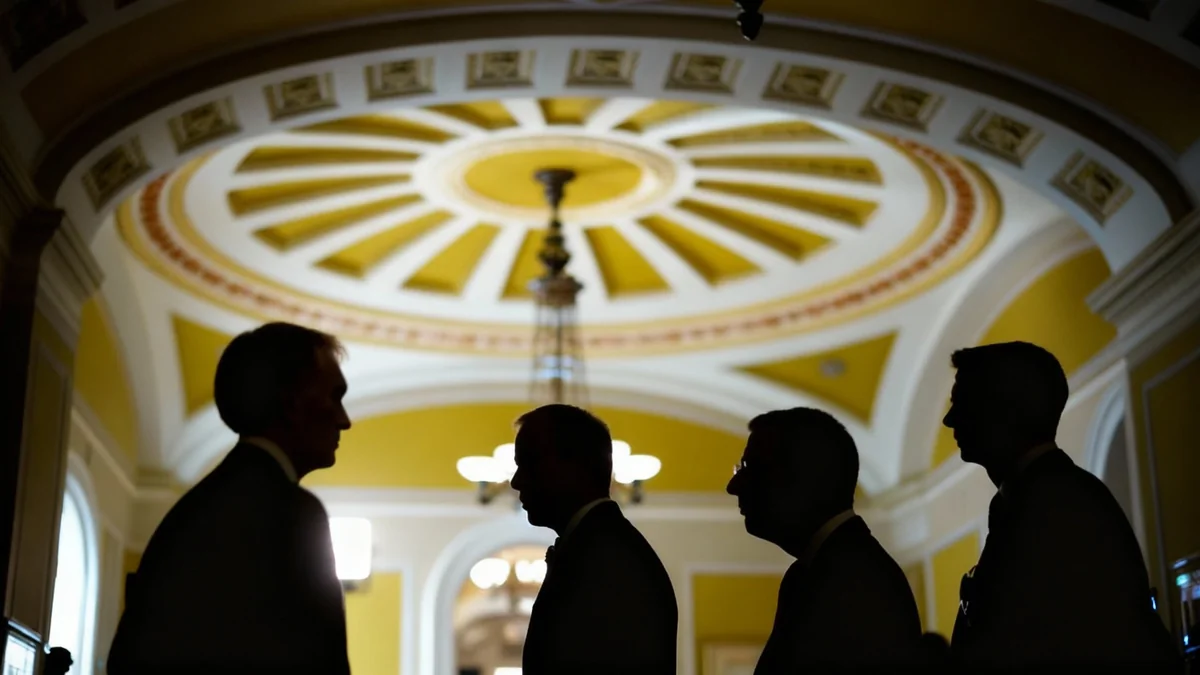The United States government is experiencing its longest shutdown in history, a 36-day impasse driven primarily by a contentious debate over healthcare subsidies. Democrats continue to block Republican-backed short-term spending measures, insisting on an agreement to extend critical Affordable Care Act (ACA) marketplace premium subsidies set to expire at year-end.
This prolonged closure has caused widespread disruption, impacting federal workers' paychecks, delaying food assistance, and leading to flight cancellations. The core disagreement highlights the enduring political divisions surrounding the ACA, more than 15 years after its enactment.
Key Takeaways
- The government shutdown has become the longest ever, lasting over 36 days.
- The primary cause is a dispute over expiring Affordable Care Act (ACA) premium subsidies.
- Democrats are unified in their demand to extend these subsidies.
- Some Republicans are now calling for subsidy extensions, acknowledging their constituents' reliance on the ACA.
- The debate mirrors past political battles over healthcare, including the 2013 shutdown.
Healthcare Subsidies at the Heart of the Standoff
Democrats have consistently refused to approve any government funding bill that does not include a provision to extend the ACA premium subsidies. These subsidies help millions of Americans afford health insurance purchased through the marketplace.
Without these financial aids, many individuals face significant premium increases, potentially losing their health coverage. Open enrollment began on November 1, revealing to many Americans the substantial cost hikes they could face next year.
Fast Fact
More than half of all ACA marketplace enrollees live in Republican congressional districts, many in rural areas or as small business owners.
Republican Divisions Emerge on ACA Subsidies
While the Republican Party has historically opposed the Affordable Care Act, a notable shift is occurring among some members. A growing number of House Republicans are now advocating for the extension of these subsidies, recognizing their importance to constituents.
Representative Jeff Hurd, a Republican from Colorado, highlighted the impact on his district. "This is a big deal in my district," Hurd stated. "I've heard from a number of people who are facing dramatic increases." He emphasized that without the subsidies, many in his heavily rural district could lose their health coverage.
Hurd is one of over a dozen House Republicans who signed a letter urging for the preservation of these subsidies. He, along with Representative Don Bacon and a pair of Democrats, even proposed a bipartisan framework for a temporary extension.
"The toothpaste is out of the tube."
Even conservative figures like Representative Marjorie Taylor Greene, known for her strong criticism of Obamacare, have called for maintaining the subsidies. She noted that healthcare costs are a top concern in her district, signaling a pragmatic shift among some within the party.
A Look Back: The ACA's Contentious History
The Affordable Care Act passed in 2010 without a single Republican vote. Its introduction sparked intense political battles, including the 2013 government shutdown. During that shutdown, Senator Ted Cruz famously filibustered for over 21 hours, speaking against the law.
Former Republican House Majority Leader Eric Cantor attributed the rise of the Tea Party and the later Make America Great Again movement, in part, to backlash against the ACA. Concerns about losing doctors, "death panels," and the general unknown fueled public apprehension.
The Unyielding Quest for an Alternative
For more than 15 years, Republicans have attempted to repeal and replace the ACA. However, a viable alternative has yet to materialize. Former Representative Fred Upton, who chaired a key committee focused on this, observed, "Here we are today, and there's still no alternative. It's been 15 years. It's not gonna go away."
House Speaker Mike Johnson, a long-time critic of the ACA, has acknowledged that a full repeal is unlikely. Despite discussions about "concepts of a plan" from figures like former President Trump, concrete reforms have remained elusive.
Johnson recently commented on the ongoing efforts, stating, "These ideas have been on paper for a long time. There's volumes of this stuff. We've been working on it since day one of this Congress."
Public Opinion Shifts on the ACA
Despite Republican opposition, the Affordable Care Act's popularity has grown over time. Ashley Kirzinger, director of survey methodology at the health policy organization KFF, notes that while a majority of Republicans still oppose the law, its overall public support is higher than ever before.
An October survey of competitive congressional districts, conducted by Republican pollster John McLaughlin, showed overwhelming support for extending the subsidies across the political spectrum. McLaughlin, who has worked with Trump, stated, "Voters are definitely more likely to vote for somebody who's gonna support a healthcare tax credit that they can use versus those who might oppose it."
- A KFF poll indicates the ACA is more popular now than 15 years ago.
- A recent survey by Republican pollster John McLaughlin found strong bipartisan support for extending subsidies.
Democrats Bet on Healthcare as a Winning Issue
Democrats are investing significant political capital in this fight, drawing lessons from the 2018 midterm elections. That year, candidates who campaigned heavily on healthcare issues swept the party back into the House majority.
Senator Andy Kim, who won a Republican-held district in New Jersey in 2018, recalled the strong public reaction to his opponent's efforts to repeal the ACA. "Everyone was furious," Kim said. "He really touched a third rail."
Similarly, Senator Elissa Slotkin, who also won her Michigan race in 2018, described healthcare as the "dominant issue." Her personal experience with her mother's battle with cancer without insurance resonated deeply with voters.
Impact on States
Senator Slotkin estimates that 500,000 people in her home state of Michigan alone could see their healthcare costs double without the subsidies, potentially forcing them to drop coverage.
Meredith Kelly, a top Democratic congressional committee staffer during the 2018 midterms, credits the ACA's increased popularity to Republican attempts to dismantle it. "The best thing that happened to the Affordable Care Act politically was when Republicans started trying to take it away," Kelly explained.
Democrats believe healthcare will once again be a powerful issue in the 2026 midterms. Despite the constant news cycle surrounding other political events, the personal nature of healthcare costs is expected to cut through.
"Among all of the major ways people are paying more and the cost of living is going up, I can't think of something that is more personal than health care."
The Shutdown's Lingering Questions
Republicans criticize the high cost of the subsidies, labeling them a pandemic-era relic. They accuse Democrats of using federal workers and citizens as leverage to achieve policy goals. Senate Majority Leader John Thune, a Republican, expressed frustration, stating, "I'm still at a loss as to what exactly they're trying to get out of this... Nobody wins. Shutdowns are stupid."
However, Democratic strategists like Meredith Kelly believe their party will ultimately win the public relations battle. "What I do hope the American people understand before next November is that Democrats are on the side of lowering their costs and protecting their health care, and Republicans are not," Kelly asserted. "That will be the lasting impact of this shutdown."
Not all Democrats agree with the strategy of prolonged shutdown. Senator Catherine Cortez Masto, a Democrat from Nevada, has voted with Republicans to reopen the government, arguing against swapping the pain of some Americans for others. "I think we can keep the government open and address the looming crisis of the health care cliff that we are seeing," she said.
As the shutdown potentially extends into its sixth week, the fate of the ACA subsidies remains uncertain. The deep-seated political divisions over healthcare continue to shape American governance, echoing debates that have persisted for over a decade and a half.





